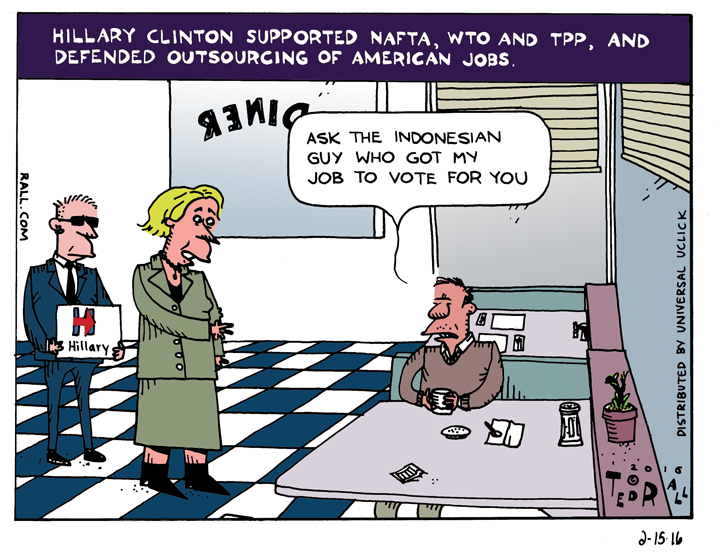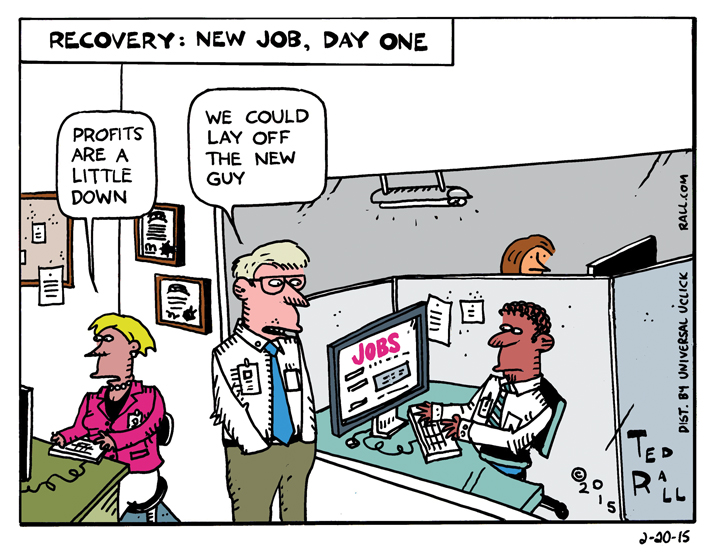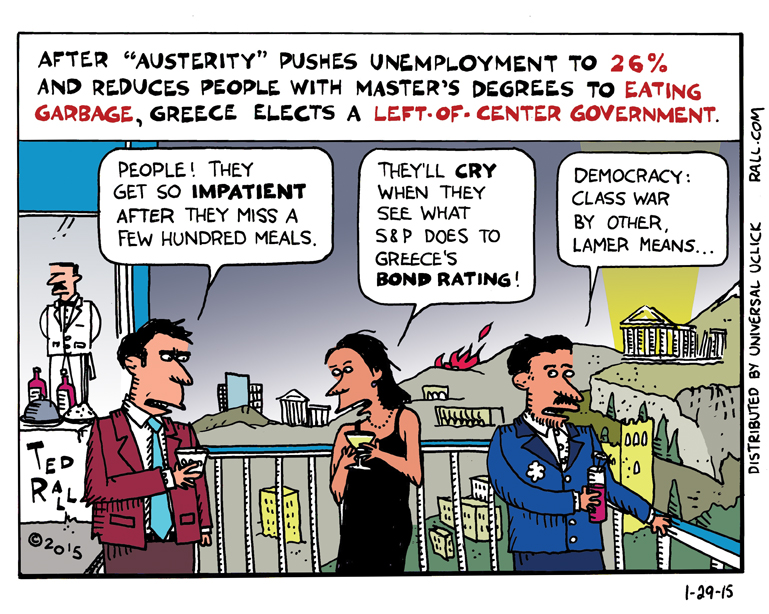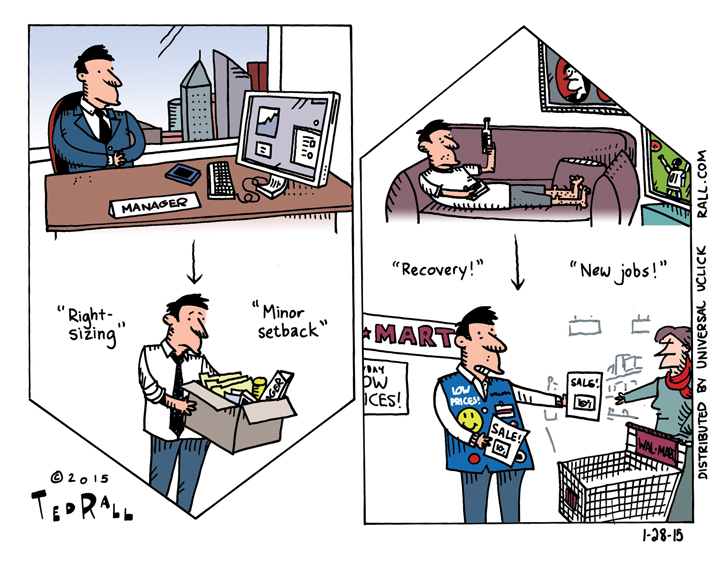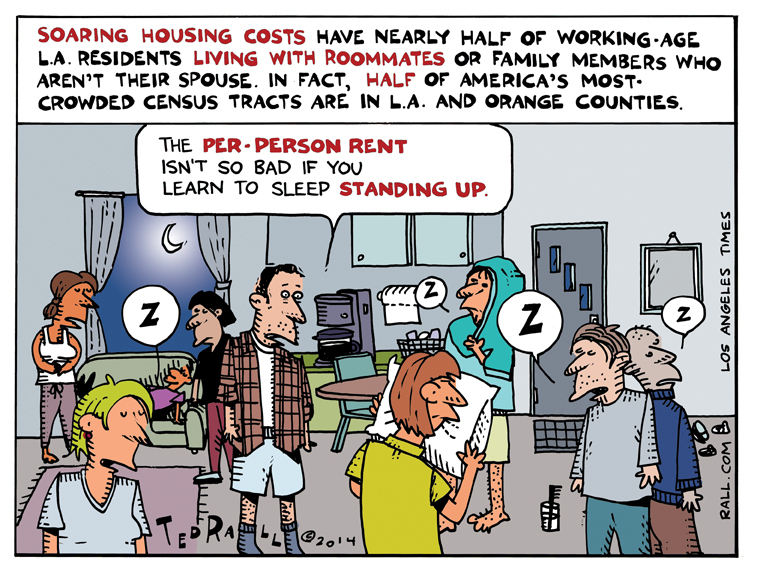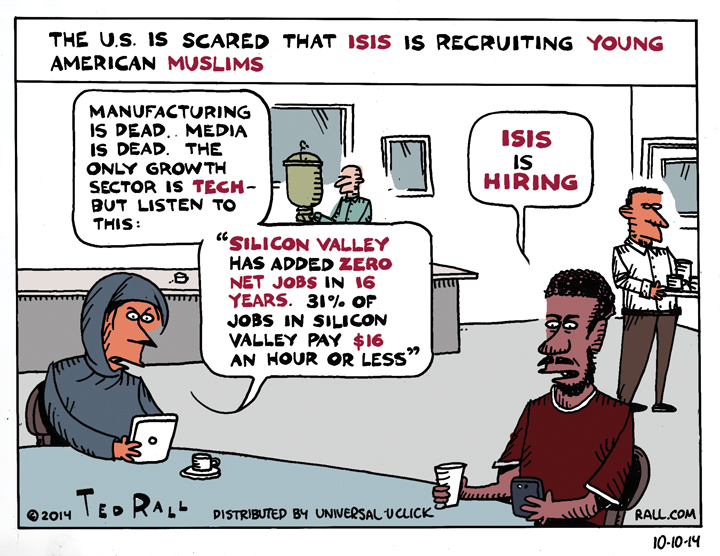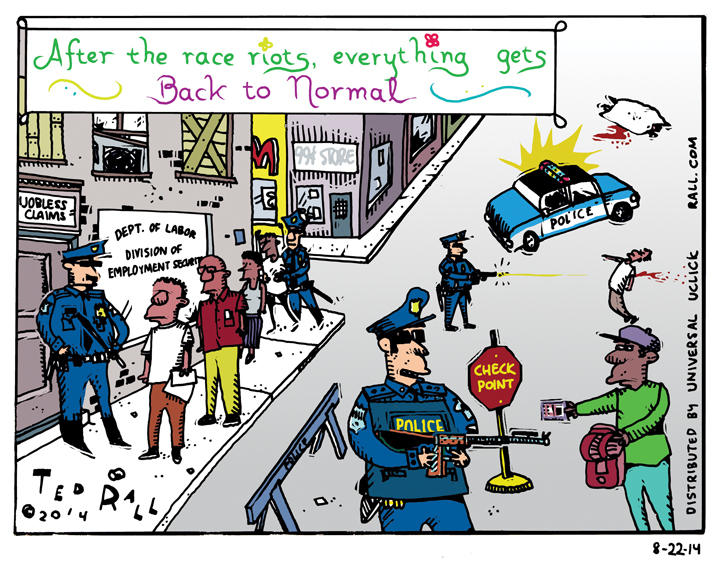Hillary Clinton has supported most “free trade” agreements that have encouraged American jobs to leave overseas. Now she’s heading to states that have been devastated by outsourcing. Will people forgive and forget and vote for her?
SYNDICATED COLUMN: Do Not Be Impressed by Mark Zuckerberg’s Phony Generosity
 CEO Mark Zuckerberg promises to give 99% of his Facebook shares to charity — eventually.
CEO Mark Zuckerberg promises to give 99% of his Facebook shares to charity — eventually.
Exact phrasing: the stock, currently worth $45 billion, will be donated “during [he and his wife’s] lives.” He’s 31 and she’s 30, so actuarial tables being what they are, by approximately the year 2065.
If Facebook or the Internet or the earth still exist.
Whoop de doo.
I would be far more impressed if Facebook would put some money into the American economy. How? By hiring more workers — a lot more workers. Facebook’s market cap is $300 billion — almost ten times more than GM. GM has 216,000 employees. I’m not sure Facebook could find work for 2 million workers — but 12,000 is pathetic. They might start by hiring a few thousand 24-7 customer service reps so they could respond quickly when some antisocial pig posts your nude photo.
The part of the “ain’t Zuck nice” philanthropist suck-uppery that really has me annoyed is the “charity” bit.
Disclosure: I’m on record as being not at all into charity. If something is important enough to require funding — helping hurricane victims, sending doctors to war zones, poetry — it ought to be paid for by society as a whole, out of our taxes. We shouldn’t allow billionaires to aggregate enough wealth to billionaires in the first place. Partly, this is because it’s unfair. No one can work hard enough to earn one billion dollars. Also because it gives too much control to individuals at the expense of the 99.99% of everyone else.
Unfortunately, we await the revolution. So we still have billionaires running around pretending to be nice (as opposed to where they belong, hanging from a lamppost).
Even by our current dismal standards, however, Zuck is full of crap.
Point one: the Chan Zuckerberg Initiative is not a charity. It’s a limited liability corporation (LLC) that, like any other company, can donate to actual charities but can also invest in for-profit companies.
Point two: this is all about control.
A donation to an independent, classic 501(c) charity can come with strings attached — the money is only for a children’s wing of the hospital, no adults — but it’s ultimately spent by the charity based on its directors’ decisions. Under the LLC structure Zuckerberg will maintain nearly dictatorial control over the funds he’s “donating” to “charity.”
It’s the difference between you giving a hundred bucks to the United Way, and taking a hundred bucks out of your wallet and dropping into a coffee can in your kitchen. Maybe the C-spot in the coffee can will go to the poor. Maybe not. It certainly isn’t accurate to claim you gave it to charity.
If Zuck wants a “gives 99% of his stock to charity” headline, he ought to earn it — by giving 99% of his stock to actual charities. Charities that aren’t named after him. Charities he doesn’t control.
“Zuckerberg To Maybe Eventually Do Things He Deems Good With Some Of His Fortune” would be more accurate.
The vagueness of the Zuckerbergs’ announcement highlights how little anyone should be impressed. “Our initial areas of focus will be personalized learning, curing disease, connecting people and building strong communities,” they said.
Sound familiar?
The Bill and Melinda Gates Foundation was founded in 2000 with billions of dollars Microsoft extracted from American consumers via price gouging and gangster-style monopolistic tactics so ugly the feds almost broke up the company. The charity’s (it’s charted as a 501(c)) mission sounds remarkably similar to those of the Chan Zuckerberg Initiative: “Our foundation is teaming up with partners around the world to take on some tough challenges: extreme poverty and poor health in developing countries, and the failures of America’s education system.”
Which, right out of the gate, meant donating PCs to schools so that fewer kids would grow up using Macs.
If you’re a conservative who thinks government can’t do anything right, let me show you a charity that’s worse. The Gates Foundation wants to destroy teachers’ unions to take away their benefits and drive down their wages — hardly a way to attract the best and brightest young college graduates into the profession. And it has poured millions into the disastrous Common Core, which has created today’s “teach to the test” culture in public schools. Given Zuckerberg’s previous involvement in public schools, a $100 million fiasco in Newark, New Jersey that declared war on teachers, fetishized standardized testing and led to so many school closures that kids wound up walking miles through gang territory to new schools chosen for them by, really, an algorithm — it isn’t a stretch to guess that Chan Zuckerberg will look a lot like Bill and Melinda Gates.
I wouldn’t expect much — much good, anyway — from Zuckerberg on the poverty front, either. After all, Facebook is spreading poverty among American STEM workers by pushing Congress for more H1C visas for foreign workers hired by big tech companies to replace better-paid Americans. Odds are that, here too, the Chan Zuckerberg Initiative’s approach will be similar to the Gateses.
Too young and too rich to have a clue — and the only people they know are over-privileged corporate pigs. How do you think this will turn out?
In 2010, for example, Bill and Melinda drew fire for subsidizing African projects by agribusiness conglomerates Cargill and Monsanto, both notorious for crushing small farmers, to the tune of $23 million. They’re way into sketchy genetically-modified foods. They wind up propping up authoritarian and dictatorial political regimes by focusing on technocratic short-term “quick fix” projects that don’t address the underlying causes of poverty (psst — capitalism). It’s a safe bet Zuck’s anti-poverty stuff will make more people poorer.
It’s Zuckerberg’s billions. He can do what he wants with his money. But let’s not make the mistake of calling him a charitable giver, much less a great guy.
(Ted Rall, syndicated writer and the cartoonist for ANewDomain.net, is the author of the new book “Snowden,” the biography of the NSA whistleblower. Want to support independent journalism? You can subscribe to Ted Rall at Beacon.)
COPYRIGHT 2015 TED RALL, DISTRIBUTED BY CREATORS.COM
SYNDICATED COLUMN: Digging Your Own Grave: Evil Employers Can Lay You Off, But You Don’t Have To Go Quietly

You’ve seen it in movies: gangsters are going to kill a guy. But before they do, they force him to dig his own grave. Who would go along with that? What are these doomed souls thinking? Why, during their final moments alive, doesn’t the victim avail himself of the chance to die defiantly, with dignity, going to his death with the small pleasure of knowing that his assassin will at least be inconvenienced by the disposal of his body?
That was the question running through my head as I read a story that made my blood boil: Disney World in Orlando, Florida recently laid off 250 tech workers and had an Indian outsourcing company supply their lower salary replacements with foreign recipients of H-1B visas. This disgusting practice, which is becoming increasingly common and is the subject of a congressional investigation and at least one lawsuit, is illegal. H-1B visas are only supposed to go to highly educated foreign workers brought to the U.S. to work for employers who can’t find American citizens to do the job — but with 3 out of 4 American techies un- or underemployed, that’s never the case.
Disney, which had a profit of $7.5 billion last year, could easily have afforded to obey federal immigration law.
If found guilty of visa fraud, Disney should be treated the same way that individual criminals get slammed by “three strikes” laws: 250 felony counts? This rogue company is too big not to be failed. It should be nationalized and its executives sent to prison for life.
The part that really got my goat was that Disney pressured its laid-off workers, many of whom had received such glowing performance evaluations that they thought they were being promoted when they were called in to meet with their bosses, to train their replacements. “I just couldn’t believe they could fly people in to sit at our desks and take over our jobs exactly,” one of the H-1B outsourcing victims, an American in his 40s who has been unemployed since his last day at Disney on Jan. 30 told The New York Times. “It was so humiliating to train somebody else to take over your job. I still can’t grasp it.”
It is astonishing how few workplace shootings there are.
Why didn’t the 250 fired workers tell Disney to go to hell, and refuse to train their replacements?
Why did they dig their own graves?
The answer is, they got paid. But not much.
Disney “offered a ‘stay bonus’ of 10% of severance pay if they remained for 90 days. But the bonus was contingent on ‘the continued satisfactory performance of your job duties.’ For many, that involved training a replacement. Young immigrants from India took the seats at their computer stations,” reported the Times.
How much cash are we talking about?
Obviously, there’s the 90 days of pay. Nonmanagerial workers laid off by Disney receive one week of pay for every full year of service. So if you worked 10 years, you’d get 10 weeks severance, plus one additional week – 10% – for the so-called “stay bonus,” for a total of 11 weeks. But to assess the net benefit, you subtract the $275 a week in unemployment benefits most workers receive in the state of Florida, as well as the 10 weeks severance the laid-off employees would have received even if they’d refused to train their replacements.
According to the corporate salary site glassdoor.com, Disney tech jobs at Orlando start at about $61,000 a year. So let’s assume that the average salary of the poor suckers pushed out the door in favor of the new guys from India was $80,000.
Disney paid the laid-off Americans $20,000 – minus income taxes, so more like $15,000 – to dig their own graves.
Look, I get it. Most Americans are living paycheck to paycheck. That $15,000 looks like it’s going to matter a lot when you’re about to lose your job, especially when you are an older worker in technology, a field where age discrimination isn’t merely tolerated, but gleefully celebrated.
At the same time, how much is your dignity worth? That’s the big picture.
Victims of oppression have a responsibility not only to themselves, but to those who are suffering at the same hands, and to the next generation of victims, to resist and throw their bodies on the gears of bloodthirsty corporate capitalism. What if every worker refused, as a matter of course, to train their replacements? The resulting disruption would create a cost for the company.
What if the standard response of a laid-off employee in the United States was not to leave quietly, but to sabotage computers with viruses, trash their office, break as much equipment as possible, and go out kicking and screaming? What if every employer who tried to replace their American workers with outsourced foreigners on fraudulent H-1B visas could count on a big fat class-action lawsuit? Resistance might make some employers think twice before behaving with such disgusting impunity.
Auschwitz survivor Primo Levi wrote that the Nazis’ great triumph in their oversight of death camps was to reduce their Jewish inmates to animals, so that they would turn against one another in their desperate struggle to subsist. Levi was haunted by the horror of what he witnessed, and how easy it was to decivilize human beings. On the opposite side of the spectrum, we celebrate the heroes of the uprisings in the Warsaw ghetto and at Sobibór death camp because, though they knew they were going to die no matter what, they fought to the end.
Comrades! Don’t dig your own graves.
Not for $15,000.
(Ted Rall, syndicated writer and the cartoonist for The Los Angeles Times, is the author of the upcoming book “Snowden,” the first biography of NSA whistleblower Edward J. Snowden. It is in graphic novel form. You can subscribe to Ted Rall at Beacon.)
COPYRIGHT 2015 TED RALL, DISTRIBUTED BY CREATORS.COM
Brother, Can you Spare a Dime? How to be Unemployed
Originally published at Breaking Modern:
Your phone rings. It’s your boss. “Hey, Ted, can you step into my office now?”
You enter your boss’ office. The first thing you notice is the lady from human resources is also with your boss. He says, “Have a seat, Ted.”
Then informs you you’re out of work.
Here comes that hollow stomach feeling.
What do you do now?
The first thing to do is to understand that you are not alone. They say the economy is recovering, and by many measures it is, yet 300,000 Americans still lose their jobs every year. If this is the first time for you, congratulations! With the old “work at the same company your whole life and retire with a gold watch” days dead and gone, the boom-and-bust cycle, coupled with the economic disruptions created by mobilization and new technology, jobs coming and going throughout your life is the new normal. If this is the second or third or fourth time, sorry – but it doesn’t make you a bad person. It isn’t personal. It’s capitalism.
The second thing to do is to not do something:
Don’t Get Angry.
You may be tempted to call your soon-to-be former supervisor bad names. You might want to cry. Trashing the office might seem like a satisfying way to go. Don’t. This particular form of temporary satisfaction comes at an unacceptably high price.
Why did you work there in the first place? Survival. You have bills to pay. Now that you have gotten fired/laid off/downsized/rightsized/whatever they’re calling it nowadays, survival is about to get tougher. Maybe your boss was an asshole, maybe it wasn’t your fault, who knows? You might even have a genuine lawsuit to file down the road. But that’s not the first, second or third thing you need to take care of.
Save your revenge for later. Right now, you have work to do.
That’s right: being unemployed is a full-time job.
Make a Graceful Exit.
This is an age of instant communications and social networks. Flame out as you head out the door with your banker’s box full of office supplies, and word will get out – most worriedly, to future potential employers who work in the same field. Assume a stoic demeanor. Take your dismissal with dignity, say goodbye to your co-workers, and be sure to leave your personal email and other contact information with those you’d like to be in touch with in the future.
Give Yourself Time to Adjust.
One of the best pieces of advice anyone gave me the last time I got laid off was: “Give yourself some time to process what has happened.” What that means in practical terms is, don’t go home and start sending out resumes right away.
You’ve just gone through the wringer; getting fired, especially in a country like the United States where your societal status is closely tied to your work, and which has a ridiculously thin safety net, is one of the most-stressful setbacks you will experience in your life. Allow yourself to pass through the four stages of grief: shock, denial, anger, acceptance.
If you feel like going out and getting drunk, do it. Wallow, rage, call your friends and chew their ears off about how evil your boss was. Vent.
But don’t make it a lifestyle. You have bills to pay, remember? The mourning process deserves at least a week, but no more than two.
File for Unemployment.
If you’re eligible – in other words, you were working a regular job, one that issues you a W-2 form, as opposed to a 1099 for freelance work – you probably qualify for state unemployment benefits.
Filing for unemployment is one of the first things you should do when you get home. Like: on day one.
Don’t feel guilty about filing for unemployment. It’s not welfare. You paid into your state’s unemployment system; all you’re doing is taking your money back out now that you need help. Depending on where you live, your salary at your previous job, and how long you worked there, your maximum unemployment benefits range from $240 to $674 per week. Considering the fact that the average duration of a job hunt is about 10 weeks, you’re going to need every penny to get by. Since we are talking about government bureaucracy, it probably will take several weeks before you start to see any money. So file quickly.
The old days of standing in line at the unemployment office are over. It’s easy to file online; simply Google the name of your state and the phrase “file for unemployment benefits.”
Answer the questions truthfully, but bear in mind that every question can and will be used against you as an excuse to deny paying you. So if you aren’t sure whether or not you’re going to receive severance, it’s better to answer the question “Will you receive severance?” with a no.
A few important quirks to bear in mind about unemployment benefits:
They don’t last forever.
If you earn money while looking for a new job, you have to deduct the earnings from that gig from your benefits. In other words, if you are getting $430 a week from the state, and you pick up $200 in freelance work that week, you have to report it, and the state will only pay you $230 that week.
However, you can mitigate this effect. Let’s say you receive two checks, each for $500. You could deposit them both the same week, report that income toward that one week, and the state will only withhold one $430 payment, in the example above.
While on unemployment, you will be expected to be looking for a new job. Most states require that you file at least three applications per week. But it’s not as hard as you think: sending an email to a prospective employer qualifies. Just keep track of the name and contact information for the companies; they will ask you for them later.
Some states will also require you to attend a “job training” seminar. Basically this will involve teaching you how to prepare a resume and cover letter and how to search job sites. Most people will find this kind of silly and useless, not to mention a distraction from actually looking for a job, but conservative politicians have managed to make this a legal requirement for receiving unemployment benefits. This will take place at an office at your nearest county seat.
Thanks to President Ronald Reagan, unemployment benefits are taxable. So remember that at the end of the year Uncle Sam will come looking for his piece of those “huge” payments you’ve been living high on.
If you were fired “for cause,” you won’t qualify for unemployment. Basically, “cause” means they let you go for a legitimate reason other than a general economic downturn or simply not meeting your position anymore, something like theft, incompetence, absenteeism, disobedience, etc.
If you really did something wrong, suck it up and learn a lesson and don’t do it anymore at your next job. But some employers fire good, honest workers “for cause” because it’s cheaper: they don’t have to pay severance and, in some states, unemployment subsidies.
That happened to me in California: I took a vacation day, came back to work and got fired, allegedly for not asking for the day off. Fortunately, I had printed out both my request email as well as my supervisor’s response message authorizing the vacation day. I applied for unemployment, the state opened an investigation, I faxed them the two emails, and they ruled in my favor in less than a week.
If you don’t deserve it, don’t let your former employer screw you. File for unemployment and make sure you present a clear, easy-to-follow case that explains why you didn’t deserve to be fired.
Maybe Do COBRA.
Federal law gives you the right to keep your existing company health insurance for up to 18 months. But your employer no longer subsidizes it. You pay for it in its entirety, which can make it pretty expensive, even if it’s at the corporate rate. I recommend you sign up for it for a month or two, and then apply for Obamacare either via the federal Affordable Care Act website or the one for your state. If you are still unemployed in a couple of months, you may qualify for Medicaid or highly subsidized health care that is a lot cheaper than COBRA.
Of course, if you are a “young invincible” millennial without any major health concerns, you might choose to go without health insurance until you find a new job. Obviously not a great idea – you never know when a meteor might crash through your ceiling – but if you go that route, make sure you stay healthy.
Tell Everyone.
The second thing you should do after filing for unemployment is to let everyone you know – friends, family members, neighbors, everyone you meet – that you’re looking for work, any work, while you struggle to get back on your feet. Even if that last part about taking any work isn’t 100% true – you’re probably not really going to get involved in asbestos mitigation or fishing for Alaskan king crab – it broadcasts both your desperation and your character. People want to help you, but showing that you are open to branching out outside of your comfort zone and aren’t too proud gives them a solid inducement to do so.
Since networking is by far the most effective way to land a new job, getting the word out that you are available, and keeping the word out by repeatedly checking in with your personal and business contacts both by email and by phone, has the best chance by far of paying off.
Negotiate Severance.
If you got laid off as part of corporate downsizing, there is a strong chance that your former employer will offer you a severance payment. In bigger companies the amount will be tied to the length of your service; in smaller ones it will basically be as little as they think they can pay you to get you to shut up.
About the shutting up part: severance payments usually go with a so-called “separation agreement” that the company will ask you to sign. Among the highlights will likely be passages in which you agree not to smear your former employer in a public venue like the Internet (a “non-disparagement clause”), promise not to share company secrets (a “nondisclosure clause”), and possibly a “noncompete” section in which you agree not to go to work for your former company’s competitors.
It will be tempting, given how broke you are about to become, to take the money and run – in other words, sign the separation agreement without attempting to negotiate. If the agreement is relatively benign, that may be okay, but read it over carefully, and if you don’t understand it have a lawyer take a look at it. Separation agreements are often legal minefields that take advantage of people who have just been fired and are still in shock.
When I got laid off from United Media, a subsidiary of Scripps Howard, they demanded that I agree to all the standard sections I described above, plus something outrageous: that I agree to never work in print or online media again. For the rest of my life. I wanted the $5,700 severance, but to never work again in my chosen field, $5.7 million wouldn’t have been enough. Scripps refused to give an inch or change a word, so I ended up leaving without getting a penny of severance. (They claimed they would never have enforced it, but if that were true, why ask for it?) Going without severance made my layoff harder, but looking back now, I’m happy I didn’t sign.
Like any legal document, you’ll have to live with the ramifications of a separation agreement for years to come. Be careful. Give your former employer what they need, like the nondisclosure and non-disparagement sections, but draw the line there. Remember: HR wants to close the file on you just as much as you want that last check.
Can You Sue? Probably Not.
It comes as a surprise to most American workers to learn that, unlike employees in most other Western countries, they are “at will” workers – in other words, their employers can fire them at any time, without notice, for no reason.
There are two exceptions to this:
If you have an employment contract that specifically states possible causes for termination, and they want to let you go for some other reason, you have legal standing to challenge your firing. But most American employment contracts specifically state that you are an at-will employee.
If you can prove that your firing is the result of discrimination due to your age (for being too old, not too young), race, gender, religion, disability, or sexual orientation, you can sue your ex-employer for back wages, reinstatement and punitive damages. Some discrimination laws depend on the state where you were working; others are federal. However, you have to reach a very high bar to prove workplace discrimination and, thanks to recent U.S. Supreme Court decisions, that bar has been raised even higher. Among other things, you will have to obtain testimony from within the company, as well as documents, that confirm a systemic pattern of, say, sexism, to which you fell prey. That is almost impossibly hard.
Launching a successful discrimination lawsuit requires either deep pockets or a lawyer willing to work on a contingency, as it will likely take many years to see your day in court, which even if you win, will be followed by countless appeals. And even if you ultimately prevail, the odds are that you will not walk away with millions of dollars, but perhaps only a nominal sum, or enough to pay your attorney’s fees.
In short, you might be able to sue, but you probably don’t want to. (An exception would be in order to make a political stand against discrimination that would protect workers from being similarly abused in the future.)
Furthermore, suing a former employer all but guarantees that you will never again find work in the same profession. Once the word gets out that you are litigious, no one will want to hire you lest you turn around and sue them too someday. So unless you are one of those 1% of 1% of 1% for whom suing is a righteous cause in and of itself, hide those revenge fantasies of soaking your evil former boss for billions of dollars away in the dark recesses of the back of your brain.
Job Hunt Smart.
You’ve read those stories about people who have been unemployed for a long time: “I sent out 5,000 resumes and never heard back from any of them.” Job sites like Indeed, Monster and LinkedIn are useful, and people do find work from them, but you are literally five to six times more likely to get a job through direct contact than by replying to a job listing.
Direct contact means exactly that: reaching out to an employer where you’d like to work, and where you’d be a good fit, regardless of whether or not they have advertised for a position. Email the big boss – yes, the president or CEO or top manager – with a cc to human resources if they have such a department just to show that you are willing to work through the system – with a two- to three-paragraph email explaining who you are, why you want to work for them, and what you can do for them. Personalize it as much as possible but don’t go crazy; you’re not going to hear back from most of them so it’s not worth spending hours on each email. The shotgun approach will work as long as it isn’t painfully obvious to your prospects.
Don’t spend all day burning yourself out sending out emails. It’s very easy to get depressed while you’re not working, and depression clouds your mind and makes it more difficult for you to brainstorm about what to do next. I recommend getting out of the house in order to clear your mind, heading down to Starbucks or your local café with your laptop, and spending from 9a.m. to 12 noon every day, Monday through Friday, with a view toward just sending out resumes and cover letters to people and places for whom you’d like to work. Don’t bring your dog with you, don’t take any phone calls, don’t chitchat with anyone else there, just work. If the café is too distracting, head to the local library.
Then kick off and enjoy the extra free time. (Some of which should include staying in good physical condition, since being in good shape will keep you mentally healthy and make you more appealing to potential employers.)
Work While You Don’t Work.
Try to scare up some freelance work while you are looking for something permanent and full time. As with unemployment benefits, every penny you have coming in will stave off financial ruin.
Think outside the box. Consider renting out that extra bedroom on Airbnb. If you live in a city or a resort community, the income could be substantial.
What you should not do, however, is to take a poorly paid full-time job – at least not until all your other prospects have been exhausted and your unemployment benefits are gone. The reason is simple: if you are working 40 hours a week at $10 an hour, when will you have time or energy to look for a job that pays $30 an hour?
Budget Cut Smart.
You’ll find it easier to find additional income than to cut your budget to solvency. After all, you can’t cut your budget to zero.
In other words, focus on the job hunt, not on cutting expenses.
That said, we all have expenses that we can cut back upon. If you have premium cable, you might be able to live with basic cable instead or cut the cord and rely on video streaming. But don’t cut back anything that could impede your job hunt, like high-speed Internet service. You’re going to need that. Same thing with the phone. Any communications lifelines have to be paid up on time.
A successful job hunt relies upon persistence, ingenuity and open-mindedness. Even if you don’t have great luck at first, keep looking and eventually you will find something.
Consider ways you can apply your existing skills that may not have previously occurred to you. For example, you might want to look into fields that you wouldn’t otherwise have considered. And be open to the world: Talk to everyone, ask questions, think about opportunities and jobs no matter what they are and where they come from.
LOS ANGELES TIMES CARTOON: Roommates from Hell
Southern California has always had one of the priciest real estate markets in the United States, but in recent years the gap between what people can afford to pay for rent or mortgage and median housing prices has opened to a gaping chasm.
Tim Logan of the Times reports about new data that reflects just how bad things have gotten for most Southlanders:
Nearly half of all working-age adults in Los Angeles and Orange counties live in a home with another adult who is not their spouse — a higher percentage than any other big city in the country, according a new report by real estate website Zillow. In second place: the Inland Empire.
Economists at Zillow crunched U.S. census numbers and found that 47.9% of adults in metro L.A. lived in “doubled-up” households in 2012, a number that has grown rapidly — up from 41.2% in 2000 — as the recession and yo-yo-ing housing market have pushed more people to share apartments.
“You’ve got a lot of households that are blending together,” said Zillow economist Skylar Olsen. “They’re doing that to make housing more affordable.”
That’s especially true in Southern California, where relatively high costs and relatively low wages combine to create what is, by some measures, the least affordable housing market in the country, especially for renters.
One has to wonder: how is this sustainable? Although there’s been some improvement in the economy, unemployment, especially long-term, remains stubbornly high. Wages remain stagnant. You can’t squeeze blood out of a stone. Won’t people just move away to somewhere more affordable?
Maybe eventually. For the time being, the pull of family ties, whatever work they currently hasveand just plain inertia is keeping hundreds of thousands of people stuck in houses and apartments that they can’t really afford. Until things turn around, maybe, someday, who knows when, they are doubling up and tripling up with friends, lovers and random people they find on Craigslist. As someone who has from time to time been forced to participate in the so-called “sharing economy” to make ends meet, I have nothing but sympathy for this situation.
Having a roommate you don’t want, simply for economic reasons, violates your privacy and sense of personal calm at least as much as secret government surveillance programs that intercept your email. This goes double if, like me, you are an introvert.
For this week’s cartoon, however, I do appreciate the fact that this predicament makes for a fun sight gag. If I had the ability to add sound here, imagine all the characters either snoring or growling ominously like zombies.
Back to Normal
Pundits and politicians are looking forward to the “recovery” following race riots in Ferguson, Missouri. What will “back to normal” look like? Police randomly stopping young black men in the streets just because, checkpoints by heavily armed uniformed goons, police shootings of unarmed men, high unemployment and underemployment.

